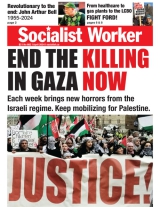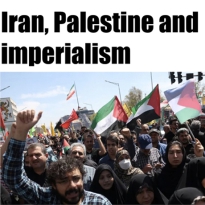Features
You are here
Mounting problems behind Chavez's victory

October 22, 2012
On 7 October, Hugo Chávez was re-elected as Venezuelan president with 55.4 per cent of the vote. Opposition candidate Henrique Capriles Radonski received almost 45 per cent, or more than 6 million votes.
According to the international press, Capriles mounted an impressive campaign – one that was modern and effective, with ample publicity. He used every opportunity to present himself as something new: young (relatively speaking), in good physical shape, good looking, gleamingly white. This novelty consisted mainly of a right wing campaign that promised to maintain elements of the social programs of the Chávez government, offering a softer version of capitalism. This meant something different from the neoliberlism that has brought such misery to Latin America since the nineties.
However, the reality is that the coalition that Capriles headed was well known and its strategy thoroughly neoliberal. Its victory would have meant the return to power of a bourgeoisie that had profited for almost a century from its close relationships with the empire to the North, and had enjoyed an oil-driven boom with all the luxurious consumption this had guaranteed. Since Chávez gained the presidency in 1998, this same bourgeoisie has mobilized all its resources in order to destroy his government and sabotage initiatives that, for all their shortcomings, at least transferred part of the profits of the oil industry towards the people.
The population has had its share of suffering from the impact of neoliberalism. In February 1989, then president Carlos Andrés Pérez announced a program of ‘structural adjustments’ demanded by the IMF. These measures rained down on the majority with brutal force. The popular answer was the Caracazo of 27 February 1989, an insurrection of the people that culminated in repression that left 3000 death (300, according to the government), many buried in mass graves. The importance of this is that Pérez had gained his re-election on the basis of a promise to mount resistance to the demands of the IMF and the World Bank. That is exactly what could be expected of a Capriles, whose allies then and now are the vicious enemies of the people.
The same Venezuelan bourgeoisie has fought without tiring against the political process that started in March 1998. In 2001, it tried to paralize the economy. In 2002 it attempted a coup, headed by the high command of the army together with the bosses organization Fedecámaras, abducting Chávez. That this attempt only lasted 48 hours was for no other reason than that the people took the streets in a mass mobilization that showed its force, but also its desire for real change. Chávez returned. The same year, the bourgeoisie continued to mobilize in a bosses’ strike which if successful would have destroyed the oil industry, and with it the entire economy. The lock-out lasted three months, and again was broken only by the initiative and resistance of the people that kept oil production going. The bosses’ lock-out was violent. And here Capriles first appeared, amidst a crowd that sought to destroy the Cuban embassy and cut off the water and electricity for those who remained in the building. This was 2002-2003, and Capriles Radonski is still the same person.
Although official spokespeople of the government insist that the vote for Chávez grew, in reality, despite a large campaign backed up by immense resources, the vote he received was much lower than any since 1998. Chavismo achieved its vigour through the hopes that were expressed in 2002, and became identified with the collective memory of the Caracazo and the mass mobilizations that it symbolized. That is why it could move forward with the unconditional support of the majority. But the reality of Venezuela is that although the names of the government departments were changed in Departments of People’s Power, and although politicians use a language that is revolutionary, socialist, and popular – reenforced by the omnipresent red attire – the country is still very far away from the promissed socialist revolution. For various historical reasons, Chávez continues to embody the revolutionary hopes for a large majority. Without a doubt, this is helped by his personality that somehow manages to float over a reality that puts this promiss more and more in danger.
One has to wonder where the real hatred of the bourgeoisie comes from. After 14 year of this process, its interests still remain largely unharmed. There has not been a redistribution of revenues. Certainly the social programs (the Misiones) have provided large resources for healthcare, educacion, and welfare, but this has not been at the expense of the capitalist class; it has been funded by the surge in oil profits. And whoever travels to Venezuela with open eyes cannot fail to notice the conspicious consumption of the bourgeoisie with its shopping centres, restaurants, the permanently guarded houses and estates, and the fourwheel drives with tinted windows that speed through the streets.
And what about popular power? When you pose this question to trade union members in Mitshubishi, the Caracas metro, or the Sidor steel plant in Ciudad Guayana, they speak of the harshest experiences – on the one side of attacks by company goons and often by the national police when they make use of their right to strike, and on the other of being denounced as counterrevolutionaries by the state. Certainly, a new labour law has been proclaimed – after 14 years – but it remains to be seen how much this will affect the practice of the state and enterprises. And when you ask the same question to the heirs of the Caracazo, those who fight to transform the life of the masses, they will say that everything is directed from above. Their struggles more and more often are confronted by a state that characterizes their fights as lack of discipline and as challenges to public order, whether it is the struggle of peasants for their land, or of communities in the barrios who demand the public services that were promised to them.
For the reality is that the state has been transformed into an apparatus of power, that dedicates itself to a slow down of all popular innitiatives, incorporating the leaders of grass root movements on the one side and strangling the popular initiatives at the local level on the other. While public services deteriorate and promises remain unfulfilled – in housing for example, only a quarter of the promised houses has been built – bureaucrats grow visibly and insultingly rich. The new bureaucracy in power (some of which consist of survivors of the previous governments), with red caps and shirts, has converted itself into a new ruling class that governs and enriches itself in the name of a people that has to accept shortages, yearly inflation above 30%, and the imposition of unelected spokespersons. The people know this, and complain loudly about rampant corruption.
Without a doubt the masses have given their support once again to Chávez. They know what the right represents for real, and they know Radonski, despite his mask. He is the mouthpiece of a class that, when it returns to power, will search horrible and devastating vengence. Chili in 1973 tells us how a bourgeoisie that has seen the real power of the people behaves. The people has experienced the possibility of change, and has turned its hopes towards the figure of Chávez. The victory of Chávez was a reaffirmation of those hopes and desires for change, as well as a resounding blow for the right.
But what next, after the elections? The bureaucracy took the victory of Chávez to be a green light to continue enriching itself, as a sign of its power. This is a mistake. Inside the Chávez-camp, there is already a discussion about the succession. The main candidate seems to be Diosdado Cabello, whose baggage is large enough to summarize here. He is also one of the richest of Venezuela (if not the richest) whose good returns are the fruit of their position within the state. He could take over the reins of power, but he surely is not Chávez, and much less a representative of the will for revolutionary change that many who call themselves chavistas still hold. On the contrary, Cabello is the living example of the internal contradictions of chavismo, between the organized people at the base and the new bureaucracy at the top.
Without Chávez controling these contradictions will require more and more repression, and the people will have to organize anew, independently of those in power. But that has to be prepared already today. The socialists, many of whom fight sincerely as part of the Chávez movement, should dedicate themselves from now on to work from the grassroots, creating the capacity to rescue socialism – the theory and practice of the working class that transforms itself into the maker of its own history – from the hands of those who try to redefine it as the instrument of a state that more and more serves its own interests.
Mike Gonzalez is a member of the Socialist Workers Party, and has been professor at the Universidad Bolivariana de Venezuela. This article is reprinted from the International Socialists’ Tendency
Section:
Topics:
- Log in to post comments










